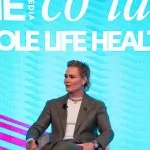Kimberly Seals Allers likes to say that Irth, the app she created to give BIPOC birthing people the power to review their doctors, is something she wished she had when she was giving birth. “I was doing all the research… really hoping to have a great birth experience,” she explained in a discussion with SheKnows Editor-in-Chief Erika Janes at the SHE Media Co-Lab Whole Life Health event at SXSW in Austin, Texas, this past March. A journalist by trade, Allers leveraged all her research skills to find a good hospital and a doctor who would care for her. But in the end, all her careful vetting didn’t matter.
“I went to a highly rated hospital and walked out wondering what just happened to me,” Allers recalled. She found herself fighting for the type of care she knew to be standard practice, and was floored by “the level of disrespect, the ways that the things that I was asking for were ignored.”
Initially, Allers blamed herself. “Did I do something wrong? Did I miss something in my research?” she recalled wondering. But as the disturbing experience drove her into the field of maternal health advocacy, she learned that the poor treatment wasn’t her fault; rather, it came back to internalized racial bias.
“I often say that hospital gown was a great equalizer,” Allers said. Her Master’s degree from Columbia University, her career in journalism — none of that mattered. “Even Black women with six-figure incomes, double degrees, have a higher likelihood of dying — and their infants have a higher likelihood of dying — than a white woman who didn’t graduate high school,” Allers explained, citing data from the National Bureau of Economic Research.
Further proof: elite athletes like Serena Williams and Allyson Felix — women with fame, health, and financial stability on their side — have spoken out about their terrifying near-death birth experiences. “This isn’t about social economics,” Allers explained. “And I think it’s really important that we acknowledge that, because… then we have to have that important but perhaps uncomfortable conversation about bias and racism.”
Irth, Allers hopes, will be a driving force behind that discussion. She described the app as “our Yelp for safe Black birth,” a place for “Black and brown birthing people to find and leave reviews on their OB-GYNs, birthing hospitals, and pediatricians,” she explained. “We are all about crowdsourcing and publicly sharing where we get good care [and] where we do not.” The name, she added, is a reference to the word “birth,” but as she says, “we dropped the ‘b’ for ‘bias.’”
The Irth team pulls data from every review, resulting in valuable feedback to help hospitals improve their care. “What can we learn from the lived experience of Black and brown folks?” Allers said. “We literally help [providers] improve their care, but we [also] hold them accountable. Too much of what’s happening to Black women is going unnoticed.”
Irth’s own birth story began in 2018 as a “mother and son project,” an app Allers originally developed and marketed with her STEM-minded teenage son. “He helped create the first wireframes for Irth, and I’m really proud of that,” Allers said. The pair’s first big win came at an MIT hackathon. Then, the grant money started coming in, allowing them to expand. Allers said she “cried all day” when she was able to hire her first Irth employee.
Now, the app serves patients at hospitals in eight different states, with “many more in our pipeline,” Allers says. As its user base grows, the Irth team seeks to approach the Black maternal health crisis from both sides. Yes, the app’s data can be a crucial tool for providers to improve their care, but reviewing a hospital or doctor on the app also puts the power back in patients’ hands. Just as an unsatisfied Yelp reviewer can impact a restaurant’s business with one bad review, so can an Irth user now critique a provider or hospital in a way that’s valuable for both the practice and other patients.
“Irth firmly believes that, as Black women who have power as consumers in our world, we are not the victims in any Black maternal crisis,” Allers stressed. “We are actually powerful change agents.”
It’s a fundamental mindset shift. “We have maternal mortality review boards… analyzing what goes wrong when a mother dies, but we don’t think that’s a sustainable strategy,” Allers explained. “We can’t try to solve this problem from the grave. With Irth, we say, let’s launch on the living, which seems like a much better strategy. We can actually capture robust lived experience and use that to prevent harm.”
Irth is looking to simultaneously improve care while empowering Black and brown birthing people. “The narrative in Black maternal health is telling a lot of people that they are lucky to be alive,” Allers says. “The hospital will tell them, ‘You’re fine, your baby’s fine,’ and they just want to move on. But we said, ‘yes, that may be true — and whatever happened to you matters’… We are not victims. We are powerful people. And we are proud of how we are leveraging that power.”



